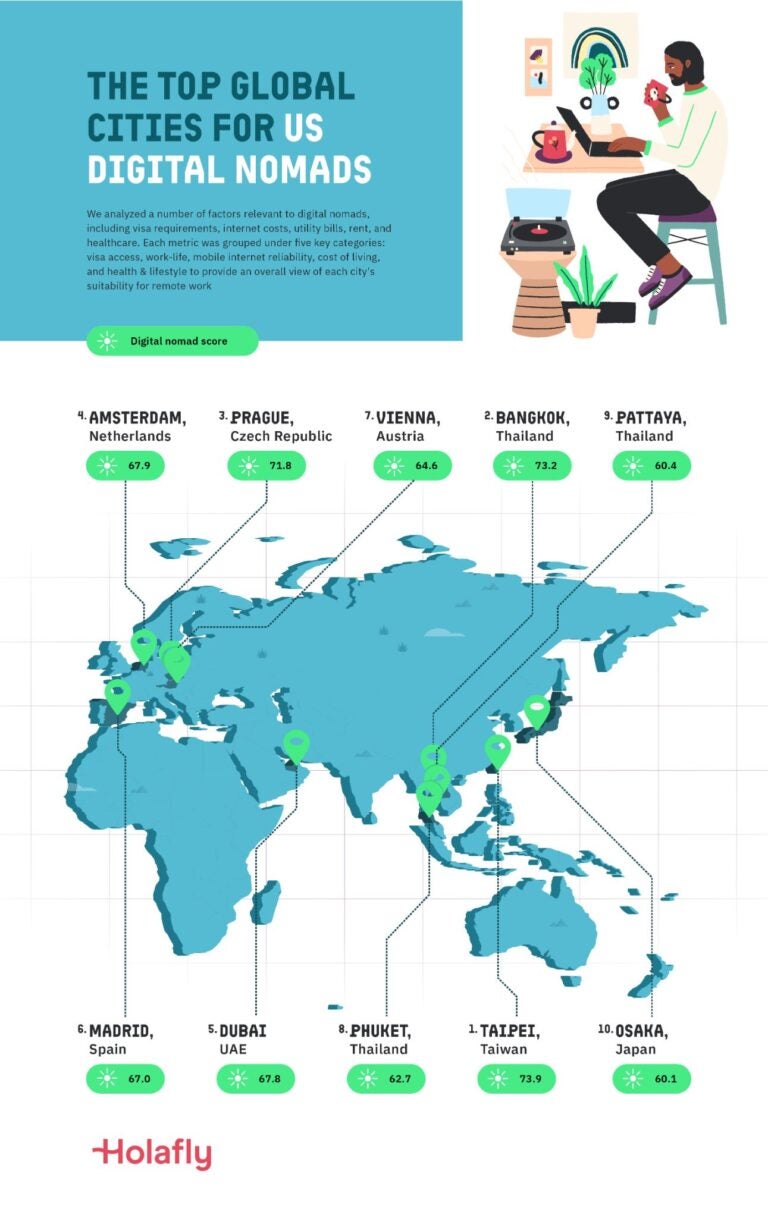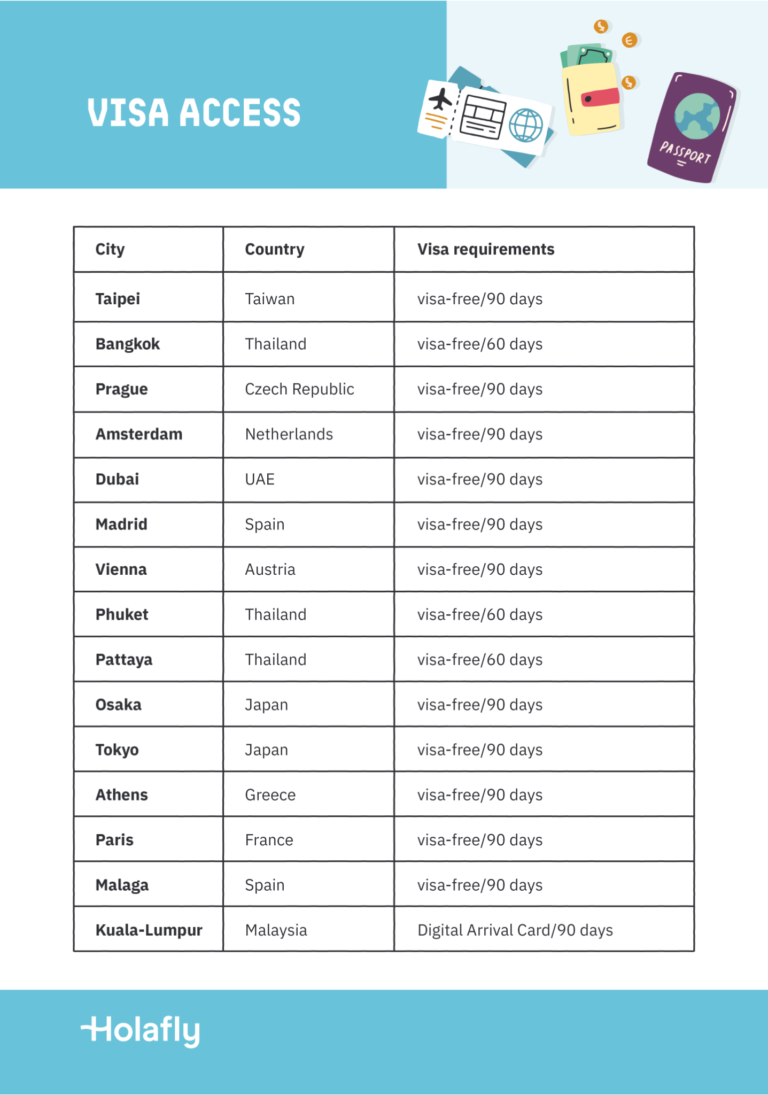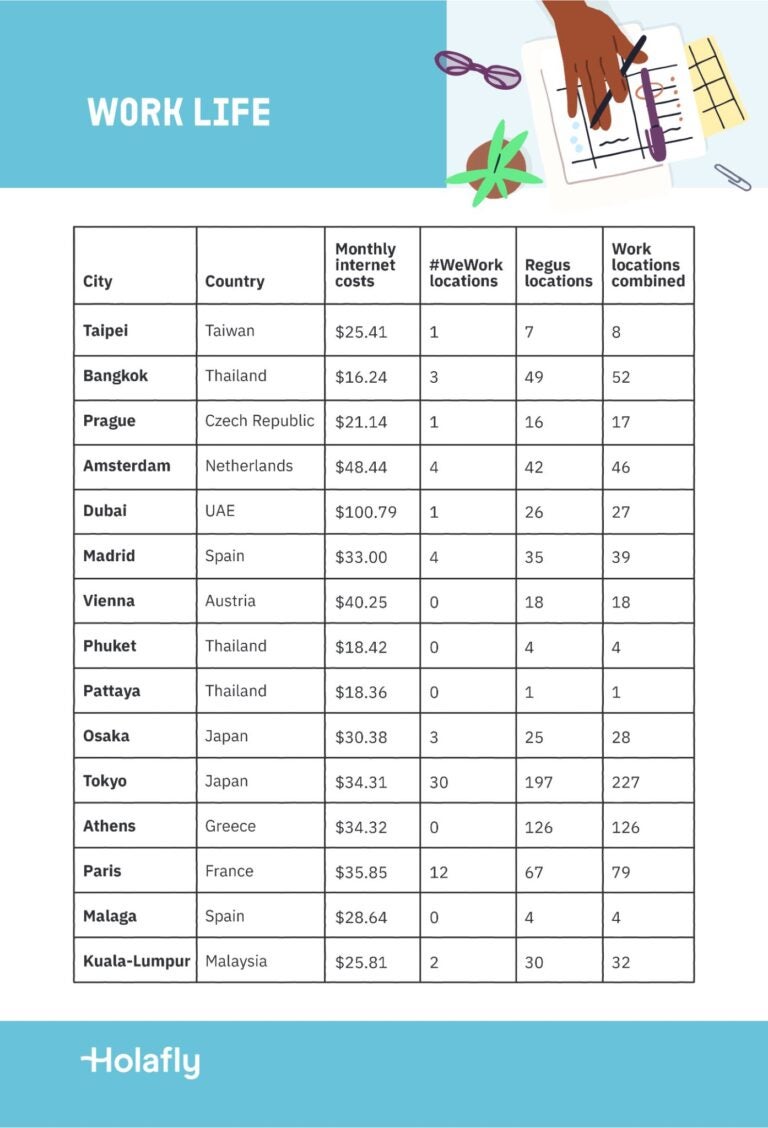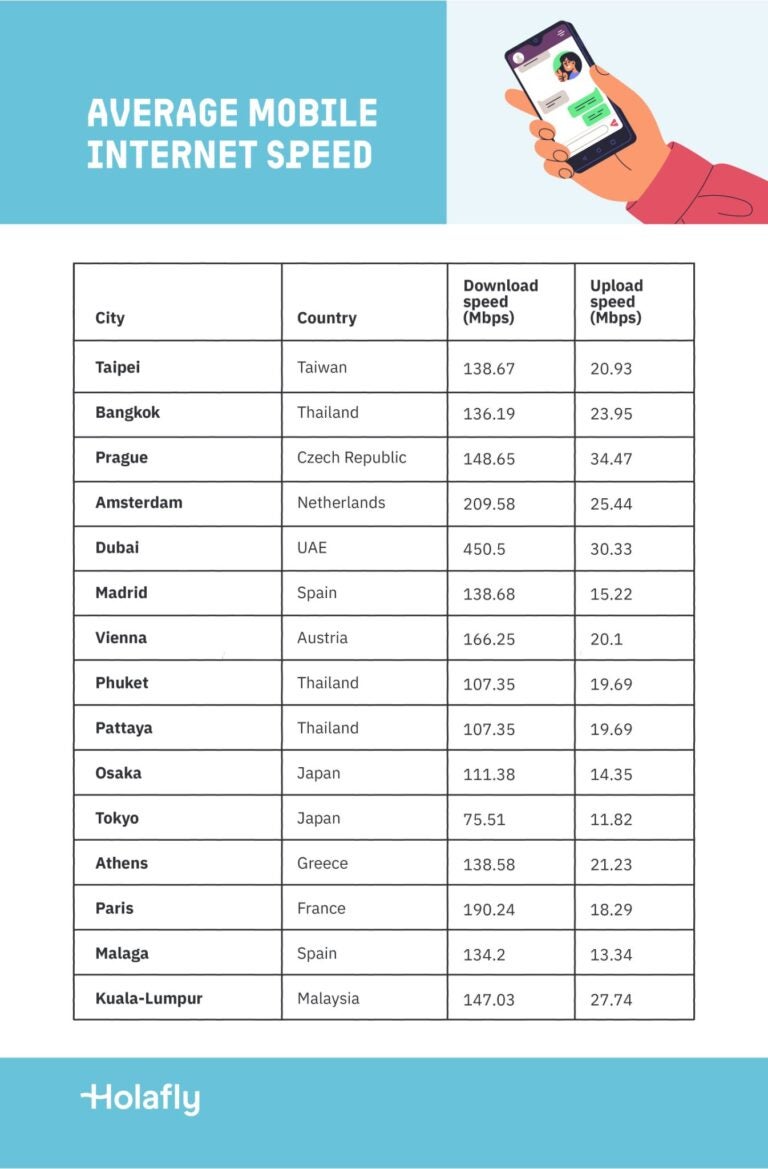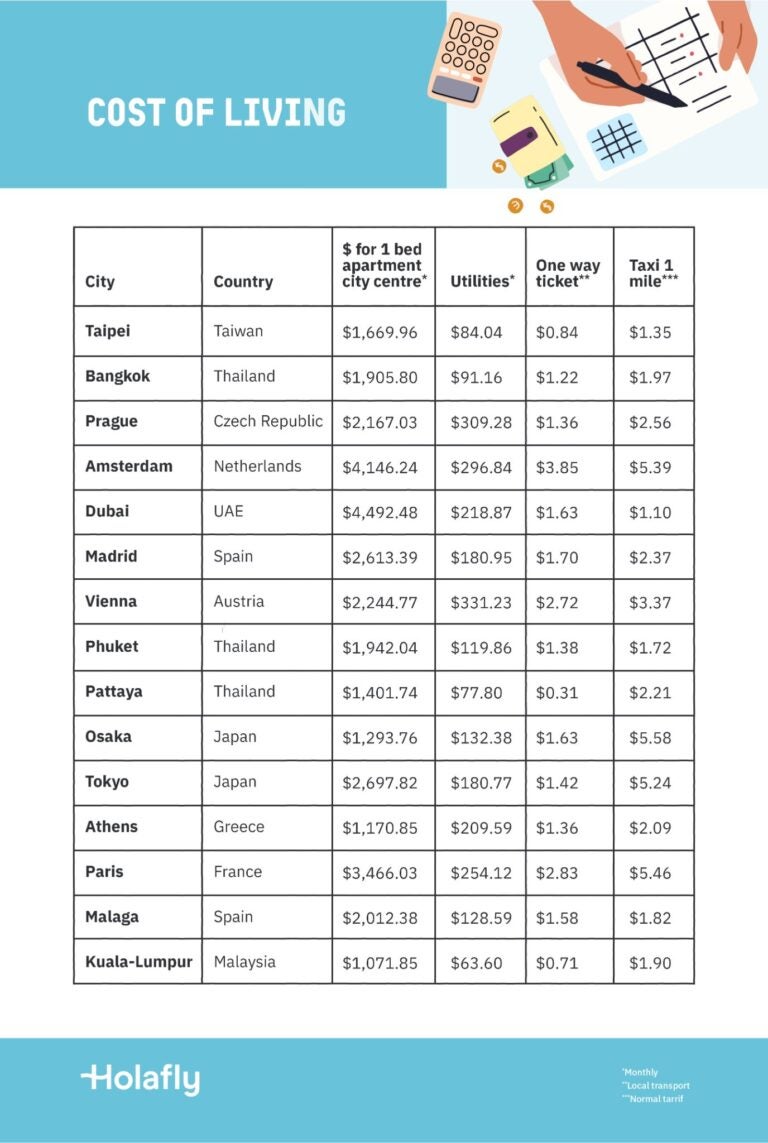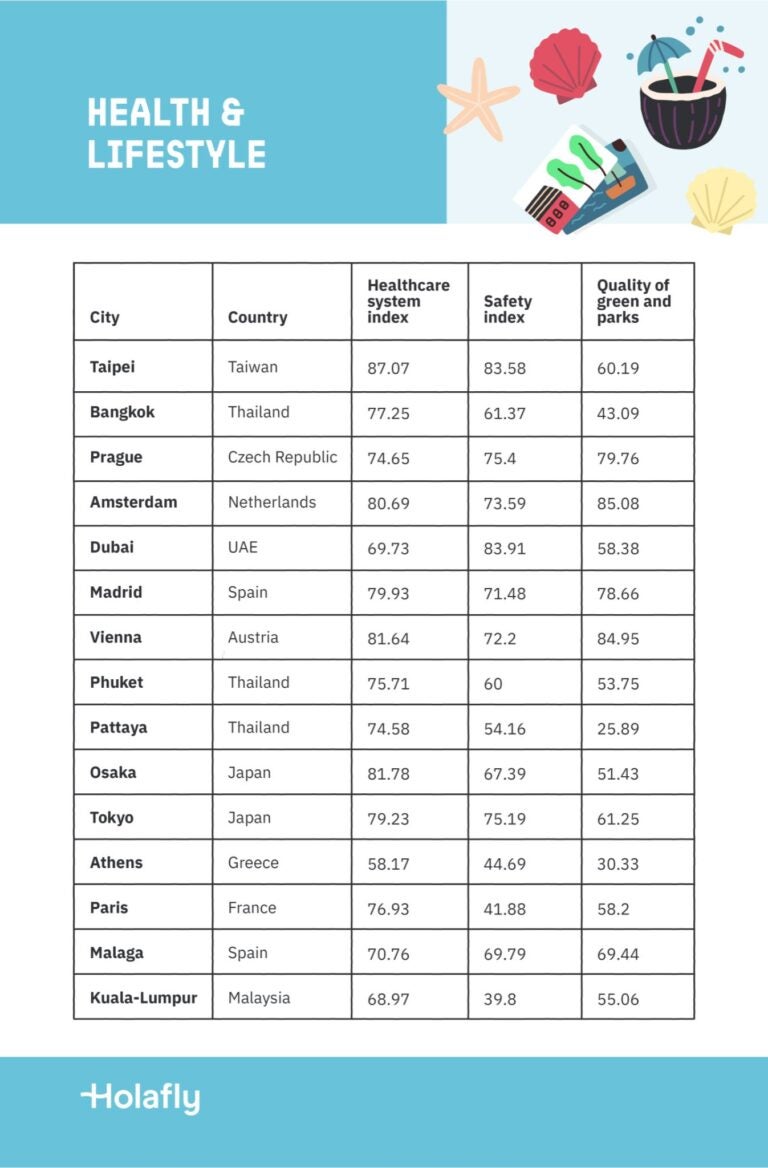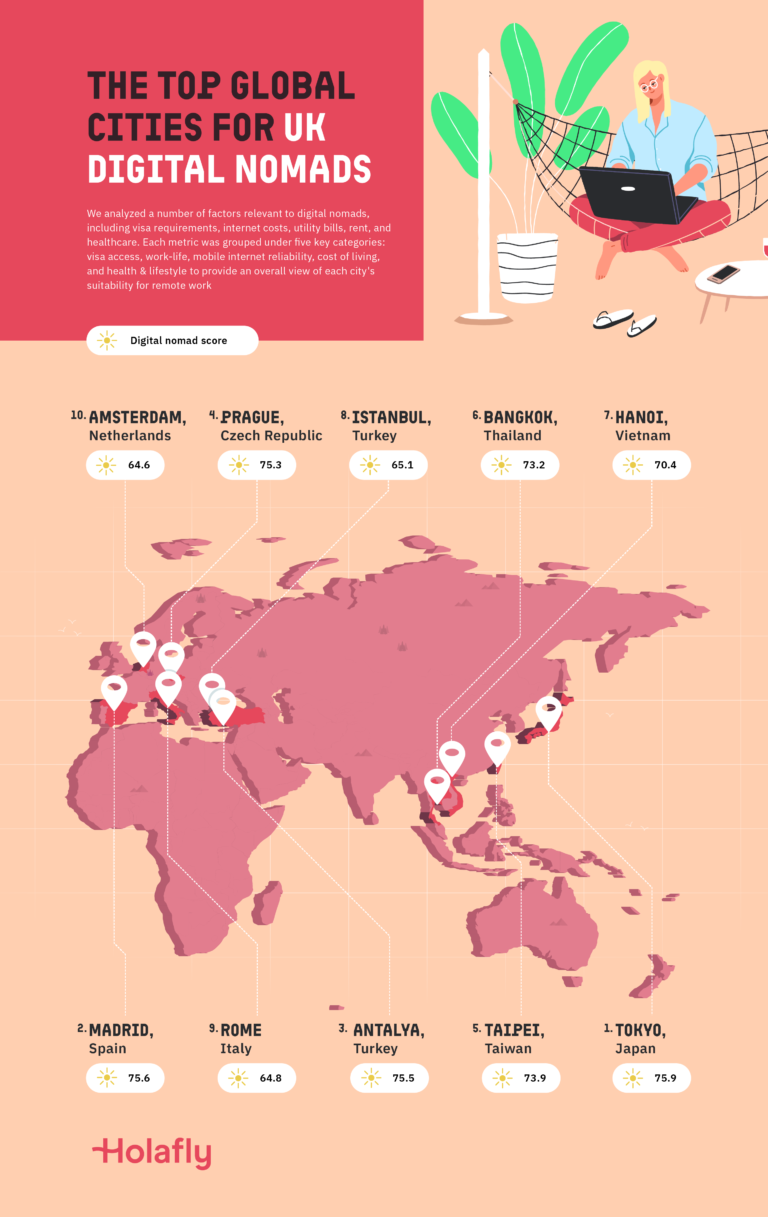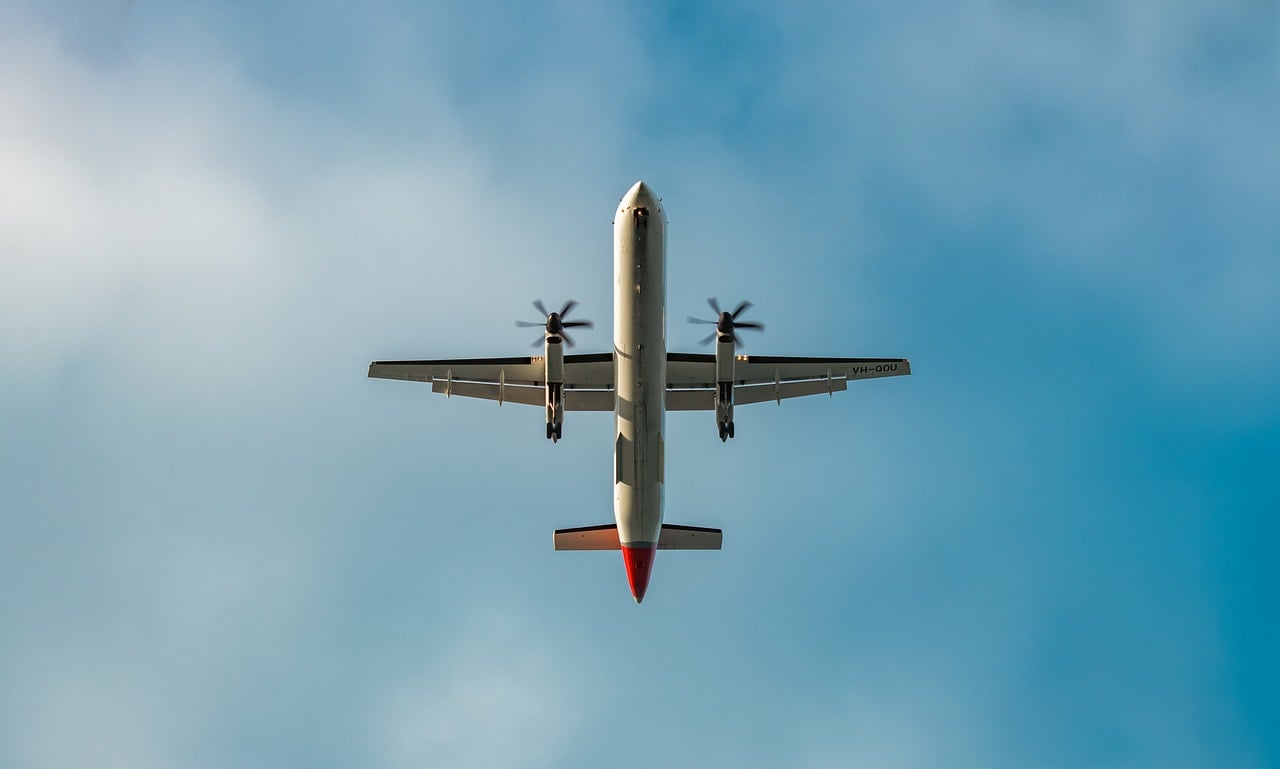The best cities for remote work: A global comparison for digital nomads
Discover the best cities for remote work. Our research covers visas, working life, mobile internet speeds, cost of living, and health and lifestyle.
In a world where remote work has become the new norm, choosing where you work from has never been more important.
For millions of professionals, a laptop, reliable WiFi, and an eSIM are all it takes for them to do their work, inspiring many to swap the traditional office setting for a life overseas.
In fact, in 2025, the global digital nomad community has surpassed 40 million, with 18.1 million hailing from the US alone – a huge 147% rise since 2019. But the digital nomad life isn’t just about moving to an idyllic setting – it’s also about well-being, safety, and cost of living to name a few.
To find out the top global cities for remote work, the Holafly Research Team has analyzed a number of factors considered important to digital nomads including visa requirements, mobile internet speeds, internet costs, utility bills, rent, and healthcare. Each metric was grouped under five key categories: visa access, work-life, mobile internet speed, cost of living, and health & lifestyle to provide an overall view of each city’s suitability for remote work.
Key takeaways from our findings
- Top cities for US digital nomads include Taipei, Bangkok, and Prague with visa-friendly policies, good healthcare, affordable living, and quality amenities supporting remote work
- Taipei is the most well rounded city, and ranks #1, with an overall score of 73.9
- Tokyo leads the way for work life and infrastructure, with 227 coworking locations
- Antalya offers the lowest rent, with an average monthly cost of $953 for a 1 bed apartment in the city centre
- Dubai is home to the fastest mobile internet speeds, with average download speeds reaching 450mpbs
- Many top cities offer visa-free entry for US passport holders for at least 60 days, making travel hassle-free and flexible for digital nomads
- Whether you’re a digital nomad from the UK or US, there’s a substantial overlap, with cities like Tokyo, Dubai, and Taipei featuring in both lists
The top global cities for US digital nomads
The following cities stand out as the top destinations for US-based digital nomads, offering visa-friendly policies, good healthcare, low cost of living and quality amenities that make remote work and life abroad both productive and enjoyable.
#1 Taipei
Taipei has emerged as the most well-rounded city for remote workers. From affordable living to a world-class healthcare system, the capital of Taiwan strikes a powerful balance between productivity and lifestyle – and US passport holders benefit from a visa-free stay of up to 90 days. While not saturated with coworking spots, Taipei offers fast, affordable internet and a growing remote work culture. Moderate rent balanced by low utilities and transport costs, also make Taipei a smart financial choice.
#2 Bangkok
With visa-free access for 60 days, a very affordable cost of living, and strong coworking infrastructure (52 workspaces), Bangkok is the second best city for digital nomads. With moderate rent ($1,900 a month for a 1 bedroom apartment), and one of the cheapest monthly internet costs ($16.24), it’s a great choice for nomads looking for great value. You can get set up quickly with reliable mobile data too via a local eSIM for Bangkok. Known for its unique blend of traditional culture and modern amenities, Bangkok offers a dynamic and affordable environment for remote workers
#3 Prague
Prague ranks as the third best city for US-based digital nomads due to a combination of affordability and visa-free access. US passport holders can enter without a visa, making it highly accessible, and the city’s above-average mobile internet speeds, paired with cheap monthly internet costs ($21.14), allow remote workers the best of both worlds. With strong scores in safety and healthcare as well, Prague offers a well-rounded, budget-friendly lifestyle in a buzzing European setting.
Visa access
One of the biggest perks for digital nomads today is knowing how many countries now welcome remote workers – with no complex visa applications in sight. Here are the most nomad-friendly cities where travelers with a US passport can enjoy visa-free entry for a minimum of 60 days – a convenient option for remote workers who want a hassle-free entry for a short to medium stay before deciding on their next steps.
Work life
For digital nomads, finding the right work environment means finding a reliable infrastructure that supports productivity, creativity, and professional growth. From monthly internet costs to the number of coworking hubs, the right environment is essential. Our analysis shows monthly internet costs vary widely, from as low as $16.24 in Bangkok to a high of $100.79 in Dubai, UAE. To help balance costs and stay connected, digital nomads can get set up quickly with a Dubai eSIM if they choose to move there.
Tokyo leads in coworking availability, boasting a massive 227 combined work locations (30 WeWork, 197 Regus), though its internet cost is on the higher side at $34.31 a month, whereas a city like Prague offers very low internet costs but has limited public work locations should you want to venture out of your accommodation. Ultimately, choosing the right city depends on your work style – whether you prioritize professional networking hubs or value a budget friendly setup.
Mobile internet speed
It’s becoming more and more of a fact that we simply cannot live without our mobile phones. Internet reliability is often something we think about a lot and to ensure our experience is a good one in another country, we often need to think about speed.
We took to researching the average mobile download and upload speed for each city to understand which are the highest performing and would therefore give you the best experience. For cities where the data was not available, we’ve used the country’s average speeds.
By a long shot, we found that Dubai offers the best mobile internet speed, with average download Mbps reaching over 450. Second place fell to Amsterdam with over 209 and third to Paris with over 190 Mbps.
Cost of living
When it comes to the cost of living, digital nomads will find big differences across global cities. At the more affordable end, Kuala Lumpur offers the lowest rent at an average of $1,071.85 for a 1-bed apartment in the city centre, with one of the cheapest transport options, including $0.71 for a one-way ticket using local transport, and $1.90 per mile taxi rides.
Thailand also delivers strong value, with a one-way ticket in Pattaya costing just $0.31 and rent of around $1,400. Cities like Amsterdam and Dubai have the highest cost of living, with monthly rent exceeding $4,000 and utilities over $200.
Asian destinations such as Taipei, Osaka, and Phuket strike a balance with reasonable rent and low public transport fares. Meanwhile, Western European cities like Madrid and Vienna are pricier but offer strong infrastructure and lifestyle perks that may justify the higher living expenses.
For digital nomads, striking the right balance between affordability and quality of life is the deciding factor. Whether you want to live in cities like Athens because of the low cost or would rather pay a premium for what Dubai has to offer, your ideal base depends on your personal lifestyle, work needs, and budget.
Health and lifestyle
When it comes to health, safety, and the quality of green spaces, digital nomads have a diverse set of cities to choose from depending on their priorities. Cities including Amsterdam and Vienna stand out with high scores across all three areas, with excellent healthcare systems (both scoring over 80), strong safety ratings, and some of the best access to parks and green spaces. Taipei also performs strongly on healthcare and safety but lacks behind when it comes to the quality of parks. Pattaya scores the lowest for green space and lower safety scores, although it does still offer good healthcare.
Choosing cities that offer good healthcare, reliable safety, and good quality outdoor environments ensures not only peace of mind, but are essential when choosing where to live.
The top global cities for UK digital nomads
When it comes to ranking the top global cities for UK based digital nomads, there are a lot of similarities with the US. Cities such as Taipei, Dubai and Tokyo appear on both UK and US lists, thanks to good visa-free policies, a high quality of life, good mobile internet speeds and a moderate cost of living for remote workers.
New cities that enter the frame for UK based digital nomads include Istanbul, Hanoi and Ho-Chi-Minh-City.
The three things every nomad realizes too late
The convenience of eSIM
eSIM technology makes it much easier to get mobile data while traveling. Gone are the days of hunting down local SIM cards or wasting time in phone shops. With eSIM technology, you can install a travel data plan in minutes, before you even leave home. As soon as you land, you’re connected. No roaming charges, no downtime, no hassle.
Password manager with 2FA
Logging into accounts from different countries can trigger security checks or lockouts. A password manager like Bitwarden or 1Password keeps your login information secure and organized. Pair it with a two-factor authentication app like Authy to avoid issues when switching devices or networks.
Mental health and routine tools
Travel can easily disrupt your routine and lead to burnout, taking a toll on your mental well-being. Apps like Insight Timer for meditation, Streaks for habit tracking, or BetterHelp for therapy can help you stay grounded and consistent. Even small daily habits can make a big difference when you’re always on the move.
Helping digital nomads decide on their next venture
As remote work continues to reshape how and where we work, choosing the right city is more than just a lifestyle choice. The most successful digital nomads seek places that support their productivity, well-being and financial goals. Whether you’re a digital nomad from the UK or the US, the top global cities offer a good mix of visa accessibility, affordability, and quality of life. While there’s an overlap, with cities like Tokyo, Bangkok, and Amsterdam, the differences emerge with destinations like Vietnam, which ranks highly for UK citizens due to visa-free stays but is less accessible for US travelers. This highlights how passport power still shapes the digital nomad experience.
Methodology
A list of the top most visited cities was collected, based on annual tourist numbers. For each city the listed metrics were collected, each falling into a category of either Visa Access, Work Life, Mobile Internet Speed, Cost of Living and Health & Lifestyle. Most of the metrics were collected at a city level, except for VISA access which was the same at a per country level. Where mobile internet speed wasn’t available for the city, the country was instead used. Each of the metrics was then ranked from 0-100 (with 100 being given to cities that performed best within that metric) before being averaged for each of the 5 categories. The 5 category scores were then averaged to give an overall score for the city. All data collected June 2025.





 Language
Language 


















 No results found
No results found

